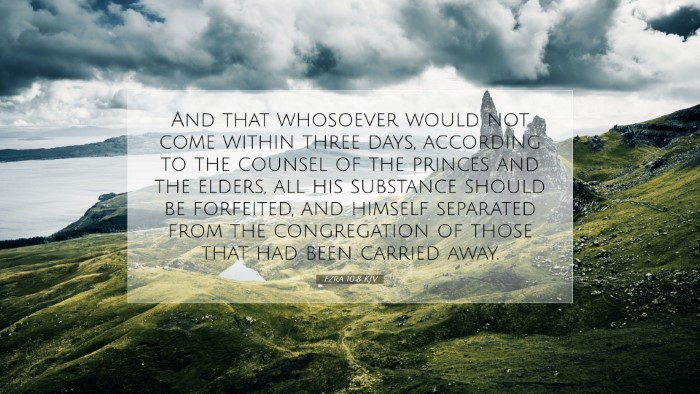Commentary on Ezra 10:8
Verse: "And that whosoever would not come within three days, according to the counsel of the princes and the elders, all his substance should be forfeited, and himself separated from the congregation of those that had been carried away."
Introduction
Ezra 10:8 presents a critical moment in the restoration of Israelite worship and community after the Babylonian exile. This verse emphasizes the urgency and seriousness of the situation faced by the returning exiles, calling them to address the issue of intermarriage with foreign women, which was seen as a direct violation of the covenant with God.
Contextual Background
The book of Ezra is set in the post-exilic period when the Israelites were returning to Jerusalem to rebuild the temple and restore their societal norms. The events leading to Ezra 10 denote a period of spiritual revival and consolidation, where Ezra stands as a leader committed to adhering to the Law of Moses.
Key Themes
- Leadership and Authority: Ezra's role as a spiritual leader is pivotal. His authority, supported by the princes and elders, calls the people to collective action.
- Consequences of Disobedience: The stipulation that non-compliant individuals would forfeit their possessions signifies both a legal and moral alignment with God's commandments.
- Community Standards: The verse illustrates the necessity for unity and adherence to divine standards within the community of believers.
Commentary Insights
Matthew Henry
Henry remarks on the gravity of the situation. The three-day ultimatum reflects not only the necessity for immediate action but also the collective responsibility of the people. He emphasizes that this exhortation to come together demonstrates the importance of communal integrity in pursuing holiness and righteousness.
Albert Barnes
Barnes elucidates the significance of the forfeiture mentioned in the verse. To him, this was not merely a punitive measure but served as a critical deterrent against spiritual laxity. The communal aspect of being "separated from the congregation" underscores the seriousness of being spiritually united and the dangers posed by discord.
Adam Clarke
Clarke highlights the profound implications of being separated from one’s community. This separation signifies a break not just from social circles but from the covenant community that God had established with His people. Clarke sees this command as a necessary step to maintain theological fidelity, arguing that such actions were vital to ensure that Israel's identity remained distinct and undiluted.
Practical Applications
- Church Discipline: The verse can inform contemporary discussions on church discipline, illustrating a scriptural basis for maintaining doctrinal purity and moral integrity within the church.
- Community Accountability: It encourages communities of faith to hold one another accountable regarding adherence to scriptural standards.
- Urgency in Spiritual Reform: The three-day time frame serves as a reminder that spiritual matters often require prompt and decisive action.
Conclusion
Ezra 10:8 is a profound directive that holds relevance beyond its historical context. It calls for a return to righteousness, accountability, and communal integrity within the body of believers. Pastors, scholars, and theologians should reflect on the implications of this verse in their own contexts, fostering a community that seeks holiness and allegiance to God's commands above all.


